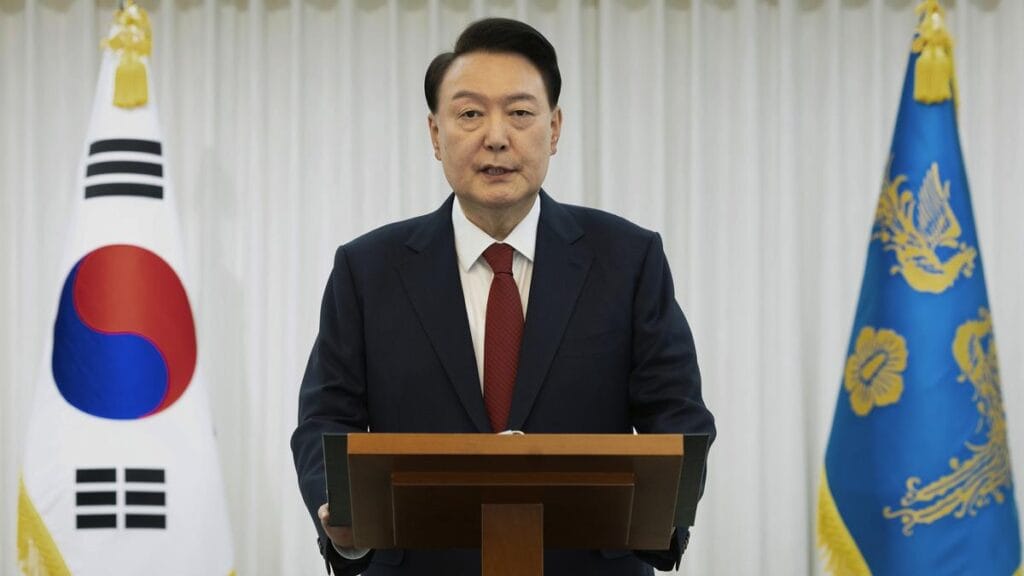South Korean President Yoon Suk Yeol’s Impeachment Sparks Political Turmoil
Embattled South Korean President Yoon Suk Yeol remains at the center of a dramatic political crisis as he resists arrest for a third consecutive day. This development follows his impeachment on December 3, 2024, after a failed attempt to declare martial law. The situation has escalated into a standoff between law enforcement and Yoon’s supporters, with widespread implications for South Korea’s political stability.
The Failed Martial Law Bid
Yoon’s declaration of martial law on December 3 aimed to eliminate what he described as “anti-state elements” threatening South Korea’s sovereignty. However, the move was short-lived, lasting only a few hours. Heavily armed troops stormed government buildings in a show of force, but widespread protests and political backlash forced Yoon to retract the order within a day.
The fallout was swift. Parliament impeached Yoon, stripping him of his presidential powers and leaving him vulnerable to criminal charges of insurrection. If convicted, Yoon could face life imprisonment or even the death penalty.
Standoff at the Presidential Residence
Since his impeachment, Yoon has refused to cooperate with authorities. His security team has blocked multiple police raids on his residence in Seoul, creating a tense standoff. Supporters and opponents of the impeached leader have gathered outside his home, with emotions running high on both sides.
In a statement circulated among protesters, Yoon vowed to fight the charges against him. “The Republic of Korea is currently in danger due to internal and external forces threatening its sovereignty,” he said. “I vow to fight alongside you to the very end to protect this nation.” Yoon’s lawyer, Yoon Kab-keun, confirmed the authenticity of the message.
Opposition’s Reaction
Opposition lawmakers have condemned Yoon’s rhetoric as inflammatory and dangerous. Democratic Party spokesperson Jo Seoung-lae called Yoon “delusional” and accused him of attempting to incite violence. The Corruption Investigation Office (CIO) chief, Oh Dong-woon, warned that anyone obstructing the arrest of Yoon could face prosecution.
Legal Maneuvers and Arrest Challenges
Yoon’s legal team has filed an injunction to block the arrest warrant, calling it an “unlawful and invalid act.” However, South Korean officials have faced difficulties executing arrest warrants for high-profile figures in the past. In 2000 and 2004, similar warrants were thwarted by supporters blocking police access during the seven-day validity period.
Political Implications and Public Response
Yoon’s impeachment and refusal to cooperate have plunged South Korea into political turmoil. Acting President Choi Sang-mok, who assumed office after Yoon’s successor Han Duck-soo was also impeached, faces immense pressure to stabilize the situation. Choi has pledged to restore order, including appointing new judges to the constitutional court overseeing Yoon’s case. However, Yoon’s staff has criticized these actions as an overreach of executive power.
The Aftermath of Martial Law
Yoon’s attempt to implement martial law highlighted deep divisions within South Korea. The declaration, intended to suppress perceived threats, instead galvanized opposition and sparked mass protests. Many critics view Yoon’s actions as a return to the authoritarian practices of South Korea’s past military regimes.
Broader Consequences
The crisis intensified over the weekend when a Jeju Air plane crash claimed 179 lives. Acting President Choi has been thrust into handling the disaster while navigating a fractured political landscape. Meanwhile, the constitutional court’s ruling on Yoon’s impeachment looms as a critical turning point for the nation.
Conclusion: A Nation at a Crossroads
South Korea’s ongoing political upheaval underscores the fragility of its democratic institutions. The standoff surrounding Yoon Suk Yeol’s impeachment and arrest has revealed deep societal divides and raised questions about the resilience of the country’s governance structures. As the constitutional court deliberates, the nation watches closely, aware that its decision will shape South Korea’s political future.

